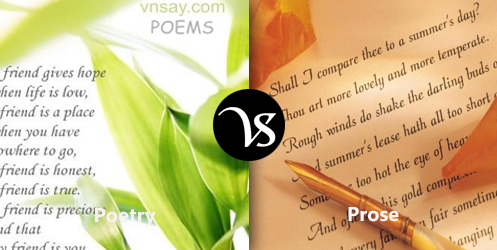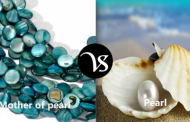 Prose:
Prose:
Prose is an ordinary form of written language which does not include rhyme. Prose lacks the more formal metrical structure of verse that can be found in traditional poetry.
Poetry:
Poetry is an art which is very impressive and has a rhythm. Poetry uses forms and conventions to suggest differential interpretation to words, or to evoke emotive responses.
Differences:
| Basis | Poetry | Prose |
|---|---|---|
| Definition (www.oxforddictionaries.com) |
Literary work in which the expression of feelings and ideas is given intensity by the use of distinctive style and rhythm; poems collectively or as a genre of literature. | Written or spoken language in the written form, without metrical structure. |
| Synonyms | Verse, paean, poems, rhyme, versification and song | Fiction, composition, speech, writing, speech |
| Antonyms | Words, polite, mild, literary and language | Truth, poem and poetry, ballad, descant |
| Pronunciation |
|
|
| Types | The types of poetry are:
|
The types of prose are:
|
| History | Poetry has a long history, dating back to the Sumerian Epic of Gilgamesh. | Isaac Newton in The Chronology of Ancient Kingdoms wrote “The Greek Antiquities are full of Poetical Fictions, because the Greeks wrote nothing in Prose, before the Conquest of Asia by Cyrus the Persian. Then Pherecydes Scyrius and Cadmus Milesius introduced the writing in Prose.” |
| Word origin | The word poetry was originated in the 14th century. | The word prose was originated in the 14th century from Middle English and Anglo French. |
| Advantages/Benefits | The advantages of poetry are:
|
|
| Example in Sentence |
|
|





